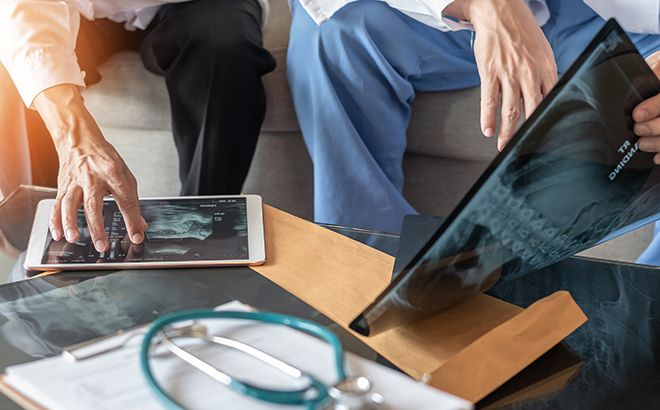We define the problem – We listen carefully – We ask targeted questions. We want to understand your pain, how it affects your daily life, and your desired outcome. We are here to instill hope and long-term pain relief for your future.
Personalized Pain Mapping is a precise, targeted, and personalized diagnostic approach we developed here at DISC to accurately identify a patient’s pain generator and spinal condition. It involves a comprehensive evaluation of the patient’s medical history, physical examination, and diagnostic imaging and injections to create a precise map of the spinal pain generator. Our proven techniques ensure patients more accurate diagnosis and leads to a customized treatment solutions which exceeds patient expectations.
The process typically begins with a detailed assessment of the patient’s symptoms, including the type, location, and intensity of pain. This information helps spine surgeon determine which specific areas of the spine may be contributing to the pain. Diagnostic imaging techniques such as X-rays, magnetic resonance imaging (MRI), or computed tomography (CT) scans may be used to visualize the structures of the spine and identify any abnormalities.
Once the potential pain generators are identified, personalized spine pain mapping may involve the use of diagnostic injections or nerve blocks to correlate the surgeon’s findings on image studies and patient described symptoms. These injections typically contain a local anesthetic and sometimes a corticosteroid. By targeting specific nerves or structures suspected of causing pain, our spine surgeon can assess whether the injection provides temporary relief or reduction in pain. This step helps confirm or rule out the suspected pain source.
Often called diagnostic pain management, PPM defines the problem by identifying the pain generator through the following approach:
Personalized pain mapping and surgical pain management can give patients hope and peace of mind. PPM can accurately define a patient’s source of pain. Our DISC surgeon can customize patient treatment options to treat their pain source directly.
We define the problem – We listen carefully – We ask targeted questions. We want to understand your pain, how it affects your daily life, and your desired outcome. We are here to instill hope and long-term pain relief for your future.
We thoroughly review your medical history, perform a physical examination, and we review your actual MRI and CT images ourselves and do not rely solely on the radiologist report. After studying the images, we can correlate clinically the best course of medical treatment needed. Then we discuss our findings with you and our next step, either conservative or personalized pain mapping, to identify the pain generator.
Our surgeons then can strategically apply diagnostic injections at the appropriate spinal level to relieve or confirm the patient’s pain generator. After the pain generator is identified and an accurate diagnosis is obtained, our surgeons can customize the patient’s treatment option that best fits their desired lifestyle.



Pain management focuses on treating symptoms with repeated steroid and trigger point injections, utilizing interventional procedures like radiofrequency ablation. Unfortunately, these injections and procedures usually provide short-term pain relief and only last six months or less.
Instead of teaching you how to manage your pain, PPM and surgical pain management focus on diagnosing and treating the underlying SOURCE of your pain. DISC surgeons receive specific education and training utilizing diagnostic injections to identify the root cause of pain. Then they treat that pain with newer, less invasive endoscopic spine surgery techniques.

Personalized pain mapping is not a pain treatment. However, PPM is a comprehensive solution that diagnoses and identifies the actual pain generator that patients are experiencing. Once your pain generator is identified, our surgeons can tailor treatment options to your specific needs. We may discover a nonsurgical solution rather than you undergo unnecessary surgery that may not solve your problem.
These treatment options may involve nonsurgical methods practiced by interventional or traditional pain management specialists because your condition is not ideal for our newly developed surgical pain management techniques. Also, nonsurgical options may include – muscle reconditioning, optimal joint mobility, and flexibility techniques.
If you are a good candidate for surgical pain management, one of our least invasive procedures, such as endoscopic laser or radiofrequency rhizotomy, will provide pain relief.
The spine surgeons at DISC look forward to helping you achieve relief after failed pain management or spine surgery. Contact us today to learn more about our personal pain mapping program.
Our spine health blog features up-to-date spine education and expert spine tips from our spine specialists here at DISC.
1635 East Myrtle Avenue Suite 100, Phoenix, AZ 85020, USA
18700 North 64th Drive Suite 105, Glendale, AZ 85308, USA
8630 East Vía de Ventura Suite 210, Scottsdale, AZ 85258, USA
3487 South Mercy Road, Gilbert, AZ 85297, USA
1635 East Myrtle Avenue Suite 400, Phoenix, AZ 85020, USA